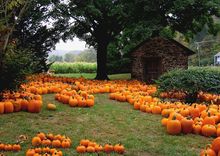With Halloween and Thanksgiving approaching, the fall season brings fields of pumpkins, making these orange fruits of the vine readily available and usually a good buy, although some food sources say fewer pumpkins will be available this year because of droughts in some areas and other conditions.

An autumn field of pumpkins
With Halloween and Thanksgiving approaching, the fall season brings an abundance of pumpkins, making these orange fruits of the vine readily available and a good buy, so why not treat your horse to some tasty pumpkin snacks.
© 2014 by Frenchtowner
Pumpkins are noted for their nutrients including high levels of vitamins A, E, folate and fiber. In addition, most horses love the taste.
Instead of throwing Jack-O-Lanterns away after Halloween, why not delight your horse with some pumpkin treats made from the carved pumpkins or simply leave the pumpkin or Jack-O-Lantern in the pasture as a toy or a horsey treat. Some horses enjoy eating the shell and all of the pumpkin.
Make sure that you remove the tough stem, since a horse might choke on it and remove any wax left by candles. Also, make sure that the pumpkin doesn't have any moldy spots before giving it to your horse. Most horses enjoy munching on the seeds, so no need to clean them out.
You may also want to cut the pumpkin in pieces to hand feed to your horse as treats as you would pieces of carrot or apple.
If you make baked treats for your horses, you can substitute mashed pumpkin for apple sauce, or simply add chunks of cut-up pumpkin, but make sure the treats you bake are healthy without too much added sugar or carbohydrates. For overweight horses or those with a metabolic condition, pieces of plain baked pumpkin make a great low-calorie snack with a low glycemic index.
One caution: If your horse has hyperkalemic periodic paralysis - HYPP - be aware that pumpkin has a relatively high level of potassium, and this can exacerbate HYPP clinical signs.
